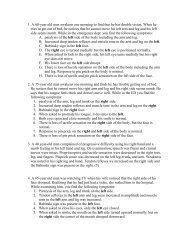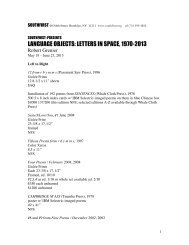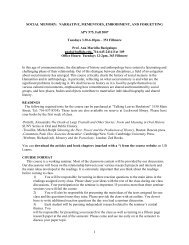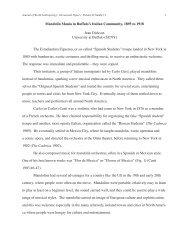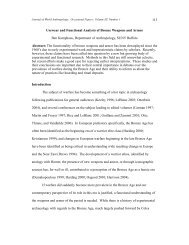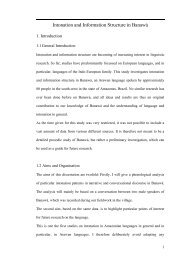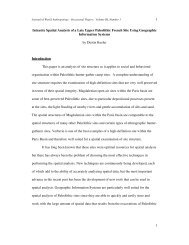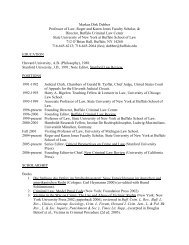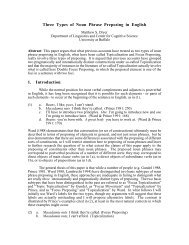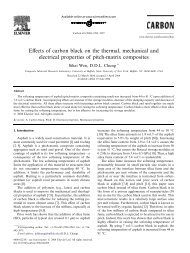- Page 1 and 2: University of Zagreb Interdisciplin
- Page 3 and 4: TABLE OF CONTENT 1. Introduction 5
- Page 5 and 6: Electrophysiological results 131 5.
- Page 7 and 8: How people comprehend language is o
- Page 9 and 10: 1.1. Sentence comprehension There i
- Page 11 and 12: syntactic structure obtained by the
- Page 13 and 14: this process many other factors pla
- Page 15 and 16: exploring sentence comprehension re
- Page 17 and 18: The major advantage of eye-tracking
- Page 19 and 20: ERP waveform. Components are conven
- Page 21 and 22: earlier syntactic component, early
- Page 23 and 24: enzyme activity, receptors or trans
- Page 25: the formulation of the models that
- Page 29 and 30: not provide such an output. In the
- Page 31 and 32: itself) is called 'pragmatic normal
- Page 33 and 34: grammatical knowledge, resembling p
- Page 35 and 36: components. However, the models tha
- Page 37 and 38: The ‘syntax-first’ model is obv
- Page 39 and 40: in which any information is process
- Page 41 and 42: into brain functions that are not n
- Page 43 and 44: Figure 4. The layered structure of
- Page 45 and 46: Activity verbs, in contrast, refer
- Page 47 and 48: step in Levelt’s model perfectly
- Page 49 and 50: language functioning and (2) scores
- Page 51 and 52: are included, as well (e.g. the Bus
- Page 53 and 54: Binding, to be more precise) to exp
- Page 55 and 56: the changes in language related com
- Page 57 and 58: esearch project, as well. The proje
- Page 59 and 60: 2. AIMS AND PROBLEMS 58
- Page 61 and 62: 2.2. Sentence Comprehension in Typi
- Page 63 and 64: The hypotheses can be grouped accor
- Page 65 and 66: 4. METHODS 64
- Page 67 and 68: On the basis of the test results 6
- Page 69 and 70: data collected within a group of ad
- Page 71 and 72: Figure 10. The presentation of the
- Page 73 and 74: The violation condition consists of
- Page 75 and 76: In Croatian adjectives usually prec
- Page 77 and 78:
object). This constitutes the viola
- Page 79 and 80:
‘tense’ experiments as well as
- Page 81 and 82:
Phonological abilities were tested
- Page 83 and 84:
. In addition, Homonyms, synonyms a
- Page 85 and 86:
software was used. The caps employe
- Page 87 and 88:
5.1. Adults 5.1.1. Behavioral resul
- Page 89 and 90:
the processes underlying comprehens
- Page 91 and 92:
Table 5. Statistical significance o
- Page 93 and 94:
calculated by subtracting the non-c
- Page 95 and 96:
assigned when the verb is presented
- Page 97 and 98:
Figure 22. Average waveform for Pz
- Page 99 and 100:
Table 8 gives the statistical signi
- Page 101 and 102:
Figure 26. The LAN effect in the
- Page 103 and 104:
Figure 28. P600 effect on the CPz e
- Page 105 and 106:
Figure 30. The waveforms at the FCz
- Page 107 and 108:
semantics distinction more relative
- Page 109 and 110:
could, in fact, be the focus of the
- Page 111 and 112:
Subject: Neuroscan EEG file: adults
- Page 113 and 114:
Figure 38. The P600 in the ‘tense
- Page 115 and 116:
Figure 41. Distribution maps in the
- Page 117 and 118:
The results of the two experiments
- Page 119 and 120:
Statistical analysis reveals P600 e
- Page 121 and 122:
Subject: Neuroscan EEG file: chiten
- Page 123 and 124:
Subject: EEG file: chitensechin2_1s
- Page 125 and 126:
Subject: Neuroscan EEG file: casech
- Page 127 and 128:
Figure 55. Difference in latency be
- Page 129 and 130:
only relatively good instrument for
- Page 131 and 132:
similar words or pseudo-words. Quic
- Page 133 and 134:
Subject: Neuroscan EEG file: slicas
- Page 135 and 136:
Subject: EEG file: slicasechi2_1s.a
- Page 137 and 138:
Subject: Neuroscan EEG file: sli_te
- Page 139 and 140:
Table 25. ANOVA results for the fro
- Page 141 and 142:
Subject: Neuroscan EEG file: casech
- Page 143 and 144:
Subject: Neuroscan EEG file: chiten
- Page 145 and 146:
5.3. General Discussion 5.3.1. Sent
- Page 147 and 148:
Croatian. In this respect ERP metho
- Page 149 and 150:
Figure 72. Difference between the e
- Page 151 and 152:
5.3.3.. The results in the light of
- Page 153 and 154:
operator projection of the clause (
- Page 155 and 156:
Leonard’s words, of ‘low phonet
- Page 157 and 158:
the ‘case-chi’ experiment and t
- Page 159 and 160:
Six ERP experiments were performed
- Page 161 and 162:
corpus of data. Future work should
- Page 163 and 164:
- Aaronson, D., Scarborough, H.S. (
- Page 165 and 166:
- Bishop, D. V. M., Frazier-Norbury
- Page 167 and 168:
- Conti-Ramsden, G., Jones, M. (199
- Page 169 and 170:
- Frazier, L., & Rayner, K. (1982).
- Page 171 and 172:
- Hagoort, P., Brown, C., Groothuse
- Page 173 and 174:
- Jurafsky, D. (2002). Probabilisti
- Page 175 and 176:
- Kovačević, M., Jelaska, Z., Kuv
- Page 177 and 178:
- Molfese, D., Molfese, V, Key, A.
- Page 179 and 180:
typically developing peers. Journal
- Page 181 and 182:
- Rumelhart, D.E., McClelland, J.L.
- Page 183 and 184:
- Tallal, P. (1976). Rapid auditory
- Page 185 and 186:
- Weber, F. M., Friederici, A. D. (
- Page 187 and 188:
LIST OF FIGURES Figure 1. The proce
- Page 189 and 190:
Figure 54. Difference between adult
- Page 191 and 192:
SUMMARY The method of event-related
- Page 193 and 194:
EXTENDED SUMMARY IN CROATIAN SAŽET
- Page 195 and 196:
teorija jezične obrade (razumijeva
- Page 197 and 198:
(kad se događa radnja), taj se val
- Page 199 and 200:
eferenci. Modularnost se, s druge s



